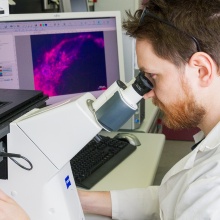Chemical‐ and Bio‐Engineering aims to develop and implement innovative economic and ecological processes and products. Chemical‐ and Bio‐Engineering stands out among the engineering sciences through its close relationship with physics, chemistry and biology. Chemical‐ and Bio‐Engineering is found everywhere, in food processing, manufacture of textiles, pharmaceutical products and cosmetics, in the production of fuels and construction materials and in energy production.
The core of the Master’s study program is formed around 14 opportunities for specialization that fall into place during the second and third Master’s program semesters (for this, see the program structure). Depending on personal preferences and subject matter abilities, the student chooses two specializations from:
- Equipment and installation engineering
- Biomedical process engineering
- Bioprocess engineering
- Chemical process engineering
- Energy process engineering
- Interface process engineering
- Plastics engineering
- Food engineering
- Mechanical process engineering
- Methods of systems dynamics
- Control engineering
- Textile engineering
- Thermic process engineering
- Environmental process engineering
The Master’s study program is directed to graduates with Bachelor’s degrees in Chemical- and Bio-Engineering and graduates in related study programs like mechanical engineering, energy engineering, environmental engineering or technical chemistry.
You should be a quick learner, can think logically and be enthusiastic about tackling engineering science problems.
As an engineering science, process technology occupies a key position in many fast-growth areas. These include bio- and nanotechnology, as well as environmental-, medical-, pharmaceutical-, food-, energy-, and chemical engineering. Furthermore, many areas of mechanical engineering, as well as related industries and various fields related to the natural sciences, are open to process engineers. For example, interfacial process engineering, food technology or textile engineering.
The sheer number of related fields in this area create the perfect environment for a successful career. Moreover, the starting salaries for process engineers are always at the top of the range within the engineering sector, due to the particularly interesting nature of this qualification.
You can find initial information on career entry paths on our web pages about internships, mentoring and career entry options.
Important Websites
Accreditation

Contact

Antje Lohmüller
Dr. rer. nat.Degree Program Manager

Joachim Groß
Prof. Dr.-Ing.Head of Institute, Program Director Chemical Engineering



